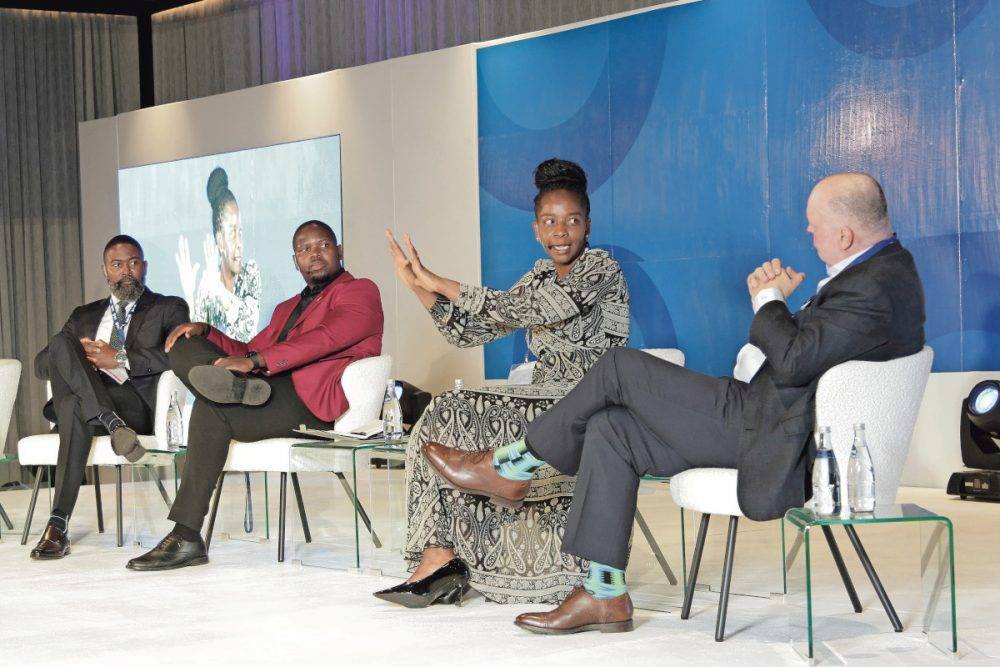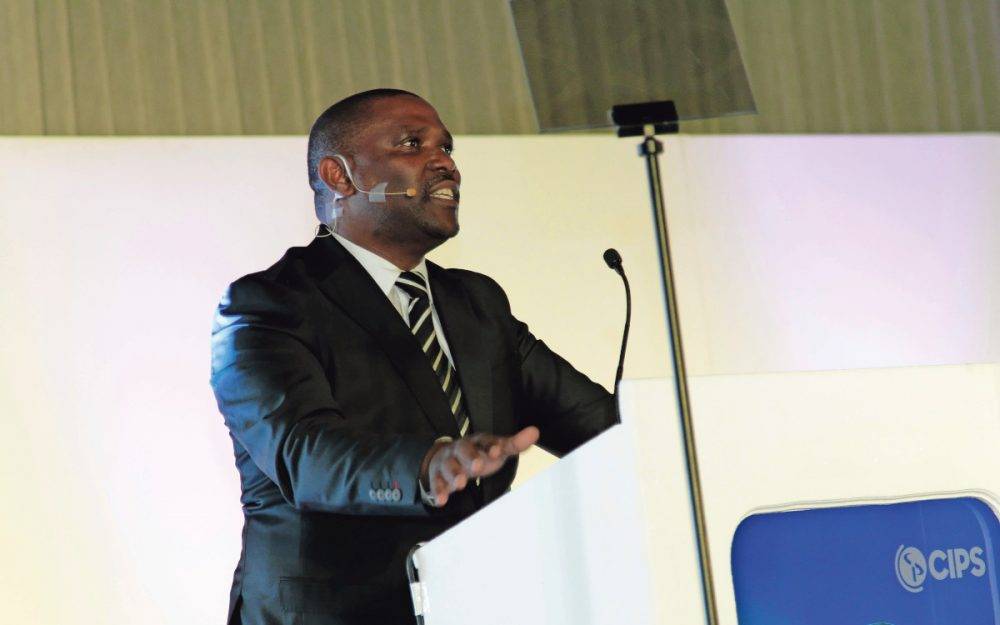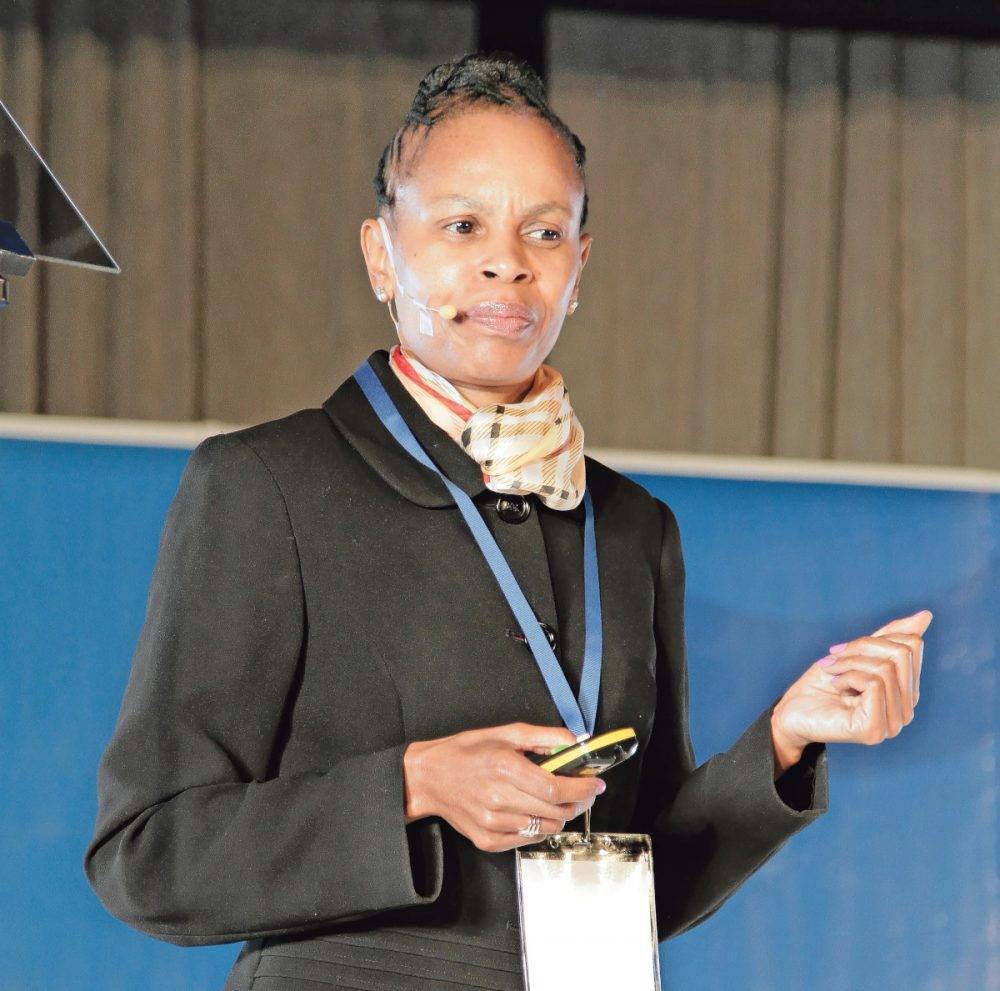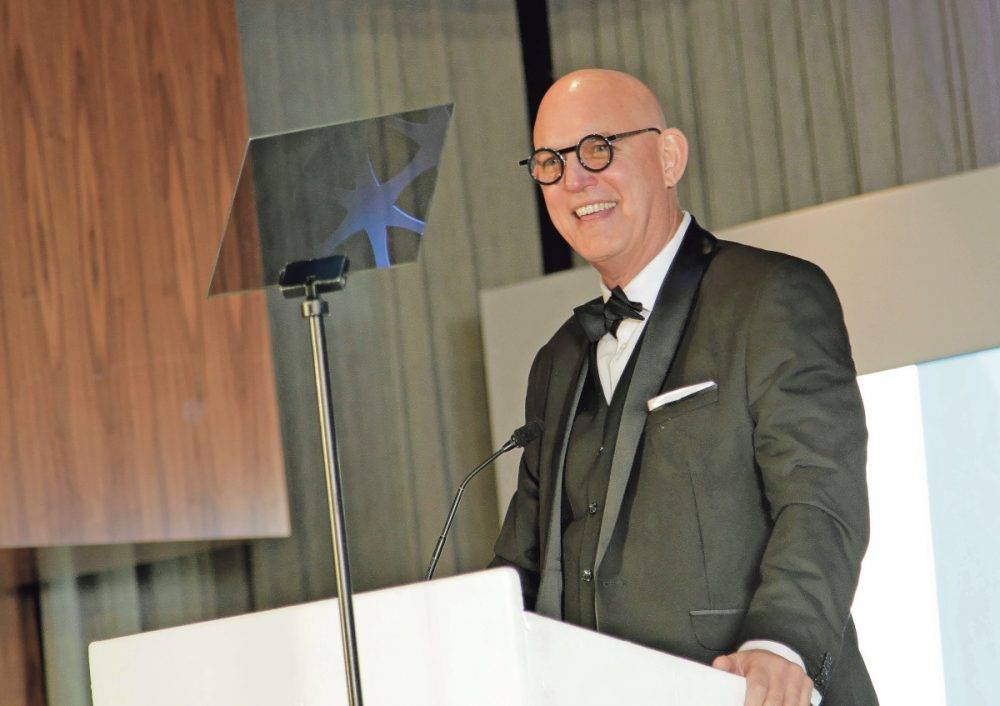CIPS interim Chief Executive Officer, Matthew Howell.
Conference speakers champion ethics and sustainability in supply chains
In an era marked by large social inequalities and economic uncertainty, and as the global economy grapples with ongoing disruptions, procurement and supply chains are emerging as powerful vehicles for positive change. Nowhere is this potential more evident than in Africa, where ethical and responsible procurement practices can play a pivotal role in transforming economies and societies.
This was the main takeaway from the CIPS Africa Conference 2024, where hundreds of procurement and supply chain professionals convened in Johannesburg last week to focus on building a more ethical and sustainable procurement profession across the continent. The two-day event, organised by the Chartered Institute of Procurement and Supply (CIPS) in partnership with the Mail & Guardian, brought together industry leaders from across the southern African region. They discussed key trends, shared best practices, and renewed their commitment to shaping the future of the industry — and repositioning procurement and supply as a force for good.
 Panellists Edson Marcus (Unitel, Angola); Tsholofelo Tsholofelo (Puma Energy, MENA); Dr Rebecca Setino (Transnet, South Africa) and Stephen Ashcroft, Conference Programme Director in a lively discussion.
Panellists Edson Marcus (Unitel, Angola); Tsholofelo Tsholofelo (Puma Energy, MENA); Dr Rebecca Setino (Transnet, South Africa) and Stephen Ashcroft, Conference Programme Director in a lively discussion.
According to CIPS Fellow and Programme Director Stephen Ashcroft, no industry is better positioned for this, as there is not a single sector that is unaffected by procurement: “By harnessing technology, enabling personal development, fostering innovation and prioritising social and environmental responsibility, we can create supply chains that not only deliver goods and services efficiently but also empower communities, protect the planet and ensure a better future for all. The conference organisers and every participant must know that none of us know more than all of us; collectively we have the answers, skills and tools needed to move the industry forward.”
The conference, themed: “Transforming procurement and supply: The road less travelled”, took an unconventional approach. It focused on fostering inclusive dialogue and an open exchange of ideas to tackle issues currently shaping the industry and the profession’s future, including sustainability, artificial intelligence (AI), digitisation, diversity and inclusion. Central to the conversation was the industry’s increasing prioritisation of ethics, both as an urgent need and a tremendous opportunity, and the need to rebuild trust in procurement practices across the continent.
‘Procurement affects everyone’
According to CIPS interim CEO Matthew Howell, disruptions in global supply chains — whether from geopolitics, climate impacts or other factors — have widespread ramifications for everyone, from individual consumers to entire economies: “Procurement affects us all, and having an ethical, highly competent profession driving sustainability through supply chains is important. Africa, with its rapidly growing youth population and economic influence, cannot be excluded from the conversation.”
As a professional body serving the public interest, Howell said upholding ethical standards was central to CIPS’s qualifications and mission. He emphasised the organisation’s role as a “broker of great conversations”, aiming to provoke new thinking and insights among procurement professionals — a role that those in attendance felt was well fulfilled.
By building the organisation’s voice and influence with governments, regulators and business leaders, Howell said CIPS can drive conversations that can create a pull towards ethical change across the continent and instil greater confidence in procurement integrity. “We do this through training, qualifications and professional standards. By growing our membership, we grow our ability to positively influence transparency, trust and ethical practices in Africa and globally.”
In his welcoming address, Howell praised industry professionals’ “resilience and ability to adapt” amid recent disruptions such as the pandemic, supply chain constraints, geopolitical disruptions and rising costs, but challenged attendees to embrace their “privileged position” and use their supply chain influence as “a force for good” in making “a cleaner, safer world for future generations”.
 Deputy Commissioner responsible for Taxpayer Engagement and Operations at the South African Revenue Service, Johnstone Makhubu.
Deputy Commissioner responsible for Taxpayer Engagement and Operations at the South African Revenue Service, Johnstone Makhubu.
Industry transformation a matter of survival
The keynote address, delivered by the Deputy Commissioner responsible for Taxpayer Engagement and Operations at the South African Revenue Service (SARS), Johnstone Makhubu, set the tone for the conference. “The need for transformation at scale has not only become a necessity; it has become a matter of survival. It’s either you transform, or you become obsolete,” he warned.
Despite the fact that we are being driven by technological advancements like AI, automation, machine learning and quantum computing, Johnstone emphasised the continued need for uniquely human abilities: “Data and big data is the new gold, but ethics must be at the core of this transformation. This will require a synthesis of people, data and technology, because machines have proven they do not have the emotional intelligence required to make ethical decisions … at least not yet. This is what gives us as humans a competitive advantage in the transactions we oversee.”
Reflecting on South Africa’s recent history, Makhubu addressed the issue of state capture. “Where were the procurement professionals during this time?” He asked. “It is clear that positioning procurement and supply professionals is the first step in capturing any economy, and indeed procurement professionals were positioned throughout the state capture project.”
 Dr Izimangaliso Malatjie from the National School of Government.
Dr Izimangaliso Malatjie from the National School of Government.
What’s driving corruption and unethical behaviour?
In a candid keynote address on the second day of the conference, Dr Izimangaliso Malatjie from the National School of Government pulled no punches, highlighting the societal pressures driving unethical conduct and corruption among professionals and public servants in South Africa. “We want to belong to the society of consumption. It’s a society of showing off … success is measured by what you have,” she stated bluntly.
She argued that professionals are incentivised to engage in unethical behaviour, such as embezzling funds or accepting bribes, to attain the trappings of wealth and status that define “success” in modern society — luxury cars, private jets, elite addresses and opulent lifestyles. “Even minor procurement decisions are unethically influenced by this mindset.”
The speech provided a blistering account of widespread corruption scandals implicating both public and private sector professionals in South Africa. She identified ethical failings enabling the rot, including fear of speaking out, favouritism in hiring and promotions, a lack of real consequences and “inconsistent application of discipline” that often amounts to “a slap on the wrist” for violations.
To combat the scourge, Malatjie advocated for a multifaceted approach that strengthens accountability, ethical leadership, consistent consequences for misconduct, merit-based hiring, transparency and making ethics “part of the metric for professionalism”.
“You cannot be professional if you are not ethical. It goes hand in hand,” she reiterated, contending that the societal forces promoting corruption must be recognised and counteracted. This can only be done through personal integrity and robust organisational cultures that prioritise ethics from top to bottom.
‘Entire GDPs pass through our hands’
For this reason, Makhubu agrees that ethics must be embedded in institutional DNA and the core ethos of the profession: “We have seen that collapsing organisations is easy and quick, but rebuilding them is tough. We must do everything in our power to ensure that the organisations we work for are never compromised by corruption and malfeasance. Africa’s GDP is estimated to be $3.1 trillion, and at the core of this GDP and production is expenditure that passes through the hands of those in this room.”
“In South Africa, government sector purchases amount to R1 trillion and public sector purchases total about R600 billion. All these funds pass through our hands. For our continent, governments, institutions, and businesses to thrive, those managing these vast economic outputs must maintain the highest ethical standards and be beyond reproach.”
Makhubu called for procurement professionals to take responsibility for value creation within their organisations and urged those who want to remain relevant to be imaginative, curious, empathetic and collaborative. “Gone are the days when procurement and supply chain professionals could be sidelined. They must move to the forefront and shape value creation for businesses,” he argued. “Embrace change. Together, we hold the key to thriving and transforming the businesses that drive the success of our countries and institutions.”
Ethical, sustainable and inclusive
From embedding ethical practices to prioritising sustainability, diversity and inclusion, managing public-private partnerships and keeping people at the centre of tech-driven transformation — procurement and supply chain professionals at this week’s CIPS Africa Conference grappled with the weighty issues that define the future of their evolving industry.
The two-day event tackled these crucial topics head-on, underscoring their rising significance for supply chains across Africa and their potential as a force for societal change and continental development. A series of expert-led panel discussions, heated debates and delegate-led exploratory sessions yielded invaluable insights for navigating an increasingly complex landscape where ethical lapses, environmental degradation and inequity can severely tarnish an organisation’s reputation and bottom line.
Procurement leaders chart the way forward
 General Manager of CIPS Southern Africa, Paul Vos.
General Manager of CIPS Southern Africa, Paul Vos.
Embedding ethics
In an increasingly globalised and interconnected world, consumers and stakeholders demand more than just quality products; they expect companies to act responsibly. Experts invited delegates to explore why ethics must take centre stage as a strategic priority. However, they cautioned, embedding ethics must go beyond mere compliance to foster a culture where integrity, fairness and respect for human rights are fundamental.
Rooting out corruption, ensuring fair labour practices and promoting honest dealings can help build trust and long-term partnerships, which are essential for sustainable growth. This is particularly crucial within African supply chains, where issues like corruption and labour exploitation have historically been prevalent.
This emphasis on ethics reflects a broader trend of increasing accountability and transparency in supply chains. The speakers agreed that in today’s environment of heightened scrutiny and conscious consumerism, embedding ethics in organisational DNA is not just “the right thing to do” but a core business imperative.
Prioritising sustainability
Industry experts made a strong case for “sustainable procurement for business results”. Sustainable procurement aligns purchasing decisions with Environmental, Social and Governance (ESG) principles, addressing issues such as carbon emissions, resource depletion and social equity. This is increasingly important amid growing pressures from stakeholders and regulators.
The panellists argued that procurement leaders are uniquely positioned to leverage their purchasing power to drive sustainable growth across supply chains. This can be done by choosing suppliers who adhere to eco-friendly practices, reducing their overall ecological footprints and supporting local economies. Strategic sourcing can catalyse economic development by supporting and developing local suppliers and the communities they operate in, contributing to both environmental stewardship and the socioeconomic development of communities.
Managing public-private partnerships
An entire session was dedicated to addressing public-private partnerships (PPPs) — or rather, the enduring fear these partnerships instil in organisations on either side of the conversation. Regulatory constraints, procurement inefficiencies, and lack of trust were identified as key barriers to collaboration. To overcome these obstacles, a partnership mindset of mutual support is required, rather than an adversarial approach.
Industry experts also called for policymakers to prioritise compliance programmes, joint training and an enabling legislative framework that fosters collaboration. When managed effectively, they argued that PPPs can drive significant economic and social benefits by improving efficiencies, innovation and resource mobilisation. These partnerships are crucial for infrastructure development, technological advancements and the large-scale project implementation outlined in national development plans. For African nations, PPPs are particularly important for bridging gaps in critical sectors like transport, healthcare and education.
By braving these fears and implementing strong partnerships across private-public demarcations, procurement professionals can help ensure that these projects are executed effectively, sustainably, and ethically.
People-centred technological transformation
How digital tools and artificial intelligence (AI) are revolutionising the procurement landscape also featured prominently across all panel discussions, as experts and delegates unpacked these emerging applications and their impact on the profession.
There was a strong consensus that emerging technologies should not be viewed as threats to job security; instead, the focus should be on how these technologies can help drive smarter decision-making. They should not replace, but augment human capabilities. AI and automation can handle repetitive and data-intensive tasks, freeing up time for procurement professionals to focus on strategic activities such as supplier relationship management, negotiations and innovation.
Continuous upskilling and training will equip the workforce to navigate this evolving landscape. This technology-driven transformation should be people-centred, emphasising the role of human expertise and judgement.
Human capital remains key
The transformation of procurement into a strategic function underscores the importance of human capital. Experts emphasised the continued importance of human capital and fostering an inclusive profession amid other competing industry trends.
Developing procurement talent, fostering leadership skills and promoting a culture of continuous improvement are critical. By recognising and nurturing the potential of procurement professionals, organisations can harness their strategic value to drive innovation, efficiency and sustainability.
Diversity and inclusion within procurement and supply chains are critical for fostering organisational and societal innovation and resilience. Diverse teams bring varied perspectives, leading to better problem-solving and creative solutions. For this reason, experts argue that creating equitable opportunities should be a top industry priority.
The power to right societal wrongs
Promoting inclusivity must encompass addressing gender imbalances within companies and communities, supporting historically disadvantaged business owners and ensuring equitable opportunities for all. This inclusiveness must extend to the supply chain itself, encouraging the development of local suppliers and creating economic opportunities in underserved communities. An inclusive approach helps to build a more robust and adaptable supply chain that is capable of weathering various challenges.
As procurement increasingly plays a central role in core business operations, these ethical, environmental and social considerations can no longer be ignored. Procurement professionals are no longer just transactional facilitators; they are strategic enablers who can drive competitive advantage, organisational growth and transformation.
Over the coming years, African supply chains will be defined by how well they embed these priorities. Whether it was discussing technology, sustainability or human capital, however, ethics emerged as the golden thread that has the power to shape the profession’s trajectory and help to build resilient, responsible supply chains across Africa and beyond.
Winners: CIPS Africa Excellence in Procurement & Supply Awards
After two days of robust engagement, the conference ended on a high note with a gala dinner to honour the winners of the 2024 CIPS Africa Excellence in Procurement & Supply.
Awards — individuals and organisations who “embody the spirit of excellence and set an example for others to aspire towards”. Speaking at the award ceremony, General Manager of CIPS Southern Africa Paul Vos reflected on the importance of not only celebrating the achievements of today, but also the promise of tomorrow.
Vos emphasised that the evening was about more than just accolades — it was a reaffirmation of the collective commitment to advancing the procurement and supply chain management profession through actions, not just words. “We celebrate tonight’s winners and look back at the journey that brought us here; we also look ahead with optimism and determination as we continue to push the boundaries of what is possible and change the status quo.”
The Safaricom team took the first accolade of the evening for Best Approach to Risk Mitigation, while DKT International Nigeria received Best Collaborative Teamwork Project. FNB was awarded the prize for Best Initiative to Deliver Social Value Through Procurement, with a merit certificate being awarded to Ey. Transnet bagged the Best Public Sector Transformation Programme.
Sustainability Project of the Year went to Equity Bank Limited. The Rohloff Group bagged Best Use of Digital Technology, with a merit certificate in this category awarded to Wartsila. Rand Water was awarded the Outstanding People Development Programme Award, while Public Procurement Project of the Year went to Sentech. The Procurement Team of the Year went to Builders.
Four individual winners were announced in the Young Talent category: Janet Kamau from Equity Group Holdings, Faith Barasa from Bic East Africa, Eric Mwendwa Kiamba from Safaricom and Lungile Nkwanyana from ABB South Africa.
The coveted Leader of the Year Award went to Vuledzani Nemukula, the Chief Procurement Officer for Transnet. Three other finalists, namely Atoapem Frimpong Barimah from Newmont Africa, Joyce John from Coca Cola and Emmanuel Chisesa from African Development Bank also received special mention for outstanding leadership.